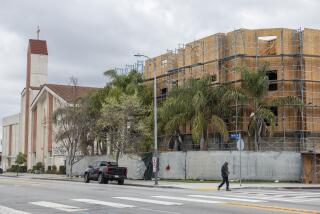COLUMN RIGHT/ JOEL FOX : State’s Tax Revolt Is Far From Over : Proposition 13 not only prevented confiscatory taxation; it also gave owners certainty.
- Share via
The U.S. Supreme Court has decided to hear a unique death-penalty case--the court will decide the life or death of Proposition 13.
Good! Let’s get on with it and prove that Proposition 13 is constitutional.
The court will test Proposition 13 on legal principles. However, the court’s decision will not be assessed by the national media as a technical interpretation of the law, but as a verdict on the tax revolt itself. Both the national media and many opponents of Proposition 13 care little if Californians are forced to pay more in property taxes. They care if the symbol for the tax revolt is torn down.
The legal test will be measured against the ambiguous standard of equity of taxation.
Proposition 13 freezes assessments at market value at the time of purchase and allows an increase for inflation of no more than 2% a year and a change to full market value when property transfers ownership.
In a unanimous decision written by Chief Justice William Rehnquist nearly three years ago, the court ruled in a West Virginia case that taxing similar property based on the value at time of purchase was a violation of equal protection of the laws.
Rehnquist included a footnote, however, that raised the question that the West Virginia decision may not apply to Proposition 13, a law enacted by the people of California to protect against taxation based on inflationary housing prices.
Historically, for the court, equity has meant equal treatment of equals. We believe that Proposition 13 affords that protection by requiring everyone to pay 1% of the value of the property at the time of voluntary purchase.
When the case comes before the court we will argue that there is a reasonable policy established by Proposition 13. The court looks for reasonable policies behind state tax laws. Not only did Proposition 13 save property from loss to confiscatory taxation; it also gave owners certainty about future property taxes.
We will remind the court of one of Adam Smith’s maxims in his seminal work on taxation, “The Wealth of Nations”: The certainty of what each individual ought to pay in taxation is a matter of such great importance that a very considerable degree of inequality is not near so great an evil as a small degree of uncertainty.
We will remind the court that Justice Frank Richardson of the California Supreme Court declared, in ruling Proposition 13 constitutional: “An acquisition value system . . . may operate on a fairer basis than a current value system.”
We will remind the court that Proposition 13 has not only given certainty in taxation and helped stimulate the economy by keeping dollars in the taxpayers’ pockets, but that it has also provided a 10% increase in property taxes for local government each year.
The property tax is a general tax, not a charge for certain services. An argument is often made that people of similar properties should pay the same for similar services. This argument ignores the individual taxpayer’s ability to pay.
Britain’s Margaret Thatcher attempted to have services paid for equally by those who received them. Her idea was to show how much local government spending really costs. Despite this worthy objective, the political results were a disaster because she, too, ignored the important requirement of ability to pay.
What happens if Proposition 13 is thrown out by the court?
Property taxes would revert to 1% of current market value. According to a state Senate commission, that would amount to an $11-billion tax increase.
A new property-tax plan will face a long, hard battle. There is no perfect solution. As the 18th-Century poet Alexander Pope discovered: “Whoever hopes a faultless tax to see, hopes what ne’er was, is not, and ne’er shall be.”
Proposition 13’s property-tax system should withstand the equal-protection challenge. However, if Proposition 13 is ruled unconstitutional, this will hardly be the end of the tax revolt, as some fervently wish. The spirit of Proposition 13 lives on. The spirit abounds in last weekend’s Connecticut anti-tax rally and in the polls measuring the opposition of California’s new tax increases.
If the court strikes down the old Proposition 13, a new one will quickly rise to limit taxation. Considering the anti-tax mood in the state, it will have the same support as the original.
Symbolically, and as law, Proposition 13 is far from finished.
More to Read
Get the L.A. Times Politics newsletter
Deeply reported insights into legislation, politics and policy from Sacramento, Washington and beyond. In your inbox twice per week.
You may occasionally receive promotional content from the Los Angeles Times.










